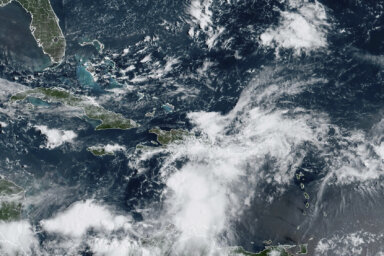Dominican Republic starts shuttering schools and offices ahead of Tropical Storm Franklin

SAN JUAN, Puerto Rico (AP) — Authorities in the Dominican Republic prepared to shut down much of the country Tuesday as Tropical Storm Franklin took aim at the island of Hispaniola that it shares with Haiti and threatened to unleash landslides and heavy floods.
The storm was expected to make landfall on the island Wednesday and bring heavy rains of up to 10 inches (25 centimeters) in both countries, with up to 15 inches (38 centimeters) in isolated areas. Heavy rainfall is of great concern to Haiti, where severe erosion in many places can lead to catastrophic flooding. A storm surge of up to three feet (one meter) also was forecast.
Dominican officials announced they would close schools, government offices and businesses by midday Tuesday and reopen them on Thursday. In Haiti, where a day of heavy rain from a thunderstorm in June left more than 40 people dead, government officials have not announced any closures, although schools were shuttered for vacation until mid-September.
The storm on late Tuesday morning was located about 220 miles (355 kilometers) south-southwest of Santo Domingo, the capital of the Dominican Republic. It had maximum sustained winds of 50 mph (85 kph) and was moving northwest at 7 mph (11 kph).
Franklin was forecast to make a sharp turn north on Tuesday. It is expected to linger on top of Hispaniola before exiting to open water late Wednesday, according to the National Hurricane Center in Miami.
Nearly half of the Dominican Republic’s 31 provinces were under red alert as the storm approached, with the Public Works Ministry announcing that it dispatched 3,000 workers to 14 provinces to prepare for Franklin. However, the government said the heavy rainfall forecast would not be a problem for the country’s multiple dams since water levels were low.
In the Haitian capital, Jerome Jean-Pierre, 46, who sells cold sodas from a wheelbarrow, said he heard about the storm on the radio and planned to stay indoors. He said he hoped Franklin would not impact Haiti like Hurricane Matthew did in October 2016.
“That was really horrible,” he said. “I saw a lot of people washed away.”
Mackenson Barbouze, a 34-year-old professor, said the timing of the storm is bad because Haiti is already struggling with a surge in gang violence, with more than 200,000 people forced to flee their homes.
“It will create chaos on top of what we’re dealing with,” he said, adding that the aftermath of storms is particularly bad in Haiti because the government is unable to respond quickly. “Most of the agencies are dysfunctional. They have the words, but they don’t have the power to get it done.”
A tropical storm warning was in effect for the entire southern coast of the Dominican Republic and Haiti. A tropical storm watch was posted for the Turks and Caicos Islands.
Meanwhile, a tropical depression in the Gulf of Mexico strengthened overnight to become Tropical Storm Harold and was expected to hit the southern coast of Texas later Tuesday.
On Aug. 10, the National Ocean and Atmospheric Administration updated its forecast and warned that this year’s hurricane season would be above normal.
Between 14 to 21 named storms are forecast. Of those, six to 11 could become hurricanes, with two to five of them possibly becoming major hurricanes, the NOAA said.
The Atlantic hurricane season runs from June 1 to Nov. 30.
Associated Press reporter Evens Sanon in Port-au-Prince, Haiti, contributed.




